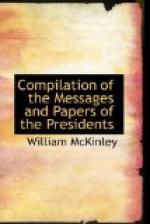DEWEY,
Care American Consul, Hongkong:
The President, in the name of the American people, thanks you and your officers and men for your splendid achievement and overwhelming victory.
In recognition he has appointed you acting rear-admiral and will recommend a vote of thanks to you by Congress as a foundation for further promotion.
LONG.
EXECUTIVE MANSION, Washington, May 19, 1898.
The SECRETARY OF WAR.
SIR: The destruction of the Spanish fleet at Manila, followed by the taking of the naval station at Cavite, the paroling of the garrisons, and the acquisition of the control of the bay, has rendered it necessary, in the further prosecution of the measures adopted by this Government for the purpose of bringing about an honorable and durable peace with Spain, to send an army of occupation to the Philippines for the twofold purpose of completing the reduction of the Spanish power in that quarter and of giving order and security to the islands while in the possession of the United States. For the command of this expedition I have designated Major-General Wesley Merritt, and it now becomes my duty to give instructions as to the manner in which the movement shall be conducted.
The first effect of the military occupation of the enemy’s territory is the severance of the former political relations of the inhabitants and the establishment of a new political power. Under this changed condition of things the inhabitants, so long as they perform their duties, are entitled to security in their persons and property and in all their private rights and relations. It is my desire that the people of the Philippines should be acquainted with the purpose of the United States to discharge to the fullest extent its obligations in this regard. It will therefore be the duty of the commander of the expedition, immediately upon his arrival in the islands, to publish a proclamation declaring that we come not to make war upon the people of the Philippines, nor upon any party or faction among them, but to protect them in their homes, in their employments, and in their personal and religious rights. All persons who, either by active aid or by honest submission, cooperate with the United States in its efforts to give effect to this beneficent purpose will receive the reward of its support and protection. Our occupation should be as free from severity as possible.
Though the powers of the military occupant are absolute and supreme and immediately operate upon the political condition of the inhabitants, the municipal laws of the conquered territory, such as affect private rights of person and property and provide for the punishment of crime, are considered as continuing in force, so far as they are compatible with the new order of things, until they are suspended or superseded by the occupying belligerent; and in practice they are not usually abrogated, but are allowed to remain in force and to be administered




